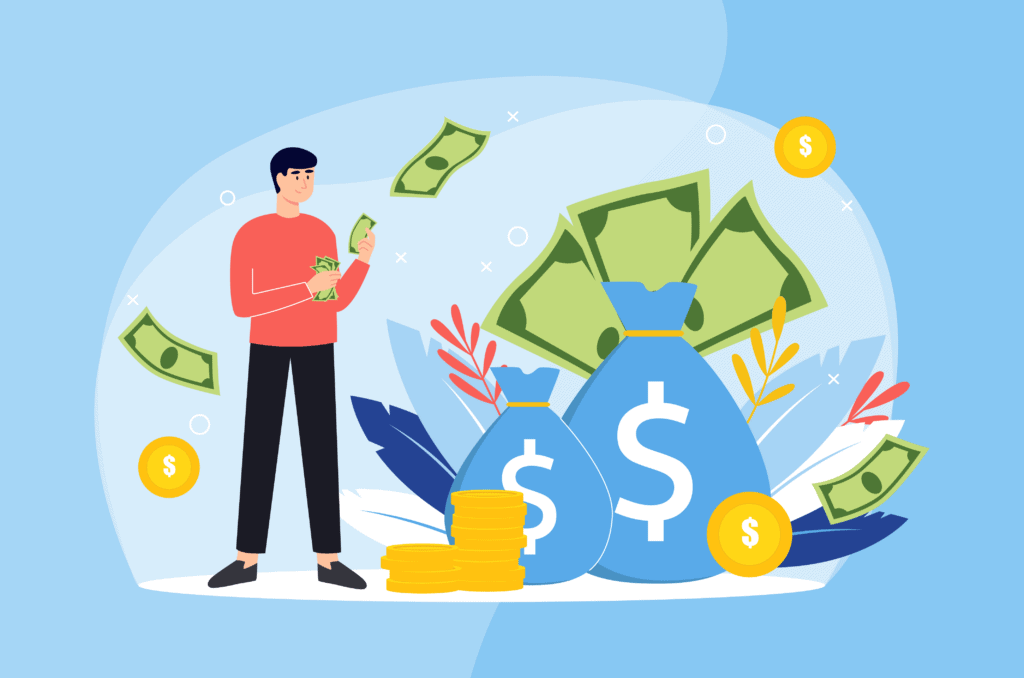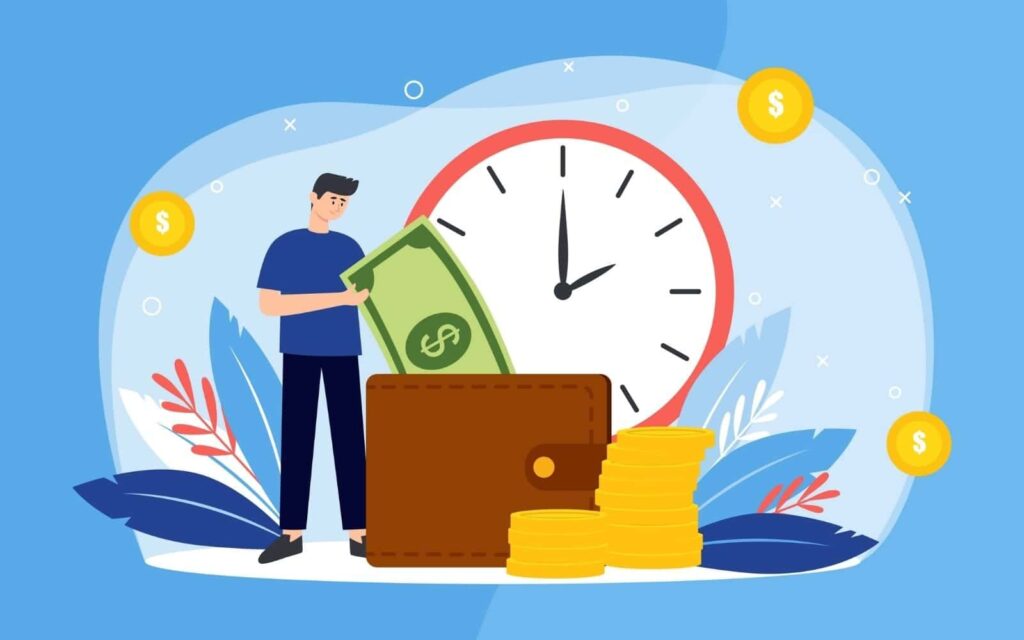Disclosure: This post may contain affiliate links. If you click on a link I may make a small commission at no extra cost to you. You can read the full disclosure here.
Last Updated on October 23, 2022 by Chris Panteli
Reasons You Can’t Save Money
Have you ever asked yourself the question why can’t I save money?
Nearly 40% of Americans would need to borrow money in some form if hit with an unexpected bill. What does this tell us? We can’t save money! Well, a large proportion can’t, and that is quite frightening.
So if you have a problem with saving money, you shouldn’t feel alone. The good news is that you can make small adjustments to your habits and start to finally grow your bank balance. The suggestions outlined below are a great place to start.
Remember, using a combination of these tactics over a significant period of time will produce the best results. And you will finally be able to say ‘I am great at saving money!’

- Reasons You Can’t Save Money
- 1. You Don’t Budget Properly
- 2. You Waste Food
- 3. Your Forget To Cancel Subscriptions
- 4. You Don’t Have Automated Savings
- 5. You Don’t Use Cashback & Coupons
- 6. You Impulse Buy
- 7. You’re Hooked On Brands
- 8. You Don’t Earn Enough
- 9. You Don’t Spend A Little When Needed
- 10. You Pay To Much On Bills
- 11. You Don’t Have The Correct Money Mindset
- Wrapping Up Why You Can’t Save Money
- Reasons You Can’t Save Money
1. You Don’t Budget Properly
Budgeting is a life skill that for some, is inherent. For others, however, it’s a talent that illudes them – and can often be the root cause to most financial problems that arise.
Unfortunately, budgeting is not on the school curriculum, at least not in any meaningful way. It really should be taught alongside other life-skills clearly needed by all of us!
I don’t profess to be any budgeting wizard, but it is something I now have a good handle on (my University days were a different story). The process is simple, and once mastered, can really alleviate financial pressures and unnecessary stress.
I love it when I come across fancy new ideas surrounding budgets and personal finance. I agree that individual circumstances mean a variety of approaches are valid. But let’s be honest guys, it’s not rocket science.
You need to ensure you have more money coming in than you have going out. I know, simple right. The reason complications arise is because of the sheer volume of transactions taking place. And therefore keeping track is hard. So sometimes its easier to bury our heads in the sand and just forget whats happening.
Mortgage payments, loan repayments, phone bills, Netflix subscription, food shopping, credit card bills, water, electric, and so on and so on.
Honestly though if you just sit down and spend an afternoon sorting through everything (fancy app or pen-and-paper work equally well) you’ll be amazed at how easily everything comes together.
I would recommend reading How to Budget & Manage Your Money by Rachael Mercer if you want some solid guidance.
You can also download my Monthly Budget Tracker Printable for free to get started.
It’s not that you can’t save money, it’s just you haven’t got the structure in place to start! Yet!
Recommended: Top Budget Categories to Organize Your Finances Right Now
2. You Waste Food
Why can’t I save money?
It’s a question we have all asked at some point in our lives. And more often than not the answer is usually pretty obvious.
Not being good with budgeting is often the main culprit. You need to have a firm grip on your finances if you ever want your account balance to turn green and grow.
But it’s the less obvious reasons that cumulatively have such a big impact on our savings.
A recent study from Penn State showed that U.S. households waste about a third of the food they purchased every year.
This is astonishing and truly suggests a great amount of money can be saved if the problem is addressed and solved. We all lead busy lives and often being over-prepared is a way to prevent our kids from not eating during hectic schedules.
It’s better to have too much, than not enough! Sound familiar?
But just think about how much extra cash you could put into your savings account if you didn’t waste food. The average household grocery bill in US cities ranges from $314 a month to $516. So even at the bottom end ($314), that’s a staggering $100 a month down the drain.
There’s a potential to save an extra $1200 a year by eliminating food waste. And yes, its easier said than done, but who said saving money was easy?
One way is to plan your meals. It takes some time, effort, and forward-thinking, but the results are quick. And once you start, it becomes pretty routine and relatively easy.
There are some awesome free printables over at LiveCraftEat to help get you started.
Also, the $5mealplan costs a tiny fraction of what you would be able to save and takes all the guesswork out of the equation. They provide weekly meal plans delivered every Friday and comes complete with a shopping list. You buy what you need, and nothing more.
Also, the recipes are budget-friendly and don’t have weird and obscure ingredients (don’t you just hate that).
You can try a 14-day free trial by signing up now, and start getting good at saving money!
Get $5 For FREE Right Now
Signup to the greatest rewards platform on the internet and earn a $5 welcome bonus…
Earn more with cashback on all your purchases, watching videos, playing games, and taking surveys. Some users can make an extra $200+ per month!!

3. Your Forget To Cancel Subscriptions
Do you think you’re rubbish at saving money because you don’t know some secret that everybody else does?
What if I told you that 84% of people have subscriptions to services they have forgotten about? How much more money do you think you would be able to save if you weren’t one of them?
Don’t get me wrong, subscriptions are great. I binge watch my Amazon Prime Video like it’s going out of fashion. And when chosen carefully, subscriptions to well-considered services can save you a heap of money in the long run.
It costs a big chunk of change to go to the cinema (not to mention the time commitment), and so having a streaming service on hand is a great idea.
I also use a multitude of blogging related services, music streaming, health and fitness programs, contact lense mail packages, food planning, investment and financial services – all of which are subscription-based. That means every month my bank account gets hit by services I have signed up for and deem valuable.
But sometimes, every now and again, you’ll forget about something and stop using it. But if you forget to cancel the subscription, you will still be getting charged. This is money down the drain, and that is a sure-fire way to be rubbish at saving money.
The answer is simple, but it will take a little time.
Conduct an audit of your bank account, and see what is going out every month. With online banking, it’s easy to assess the transactions on a month-by-month basis. Take the time to review all the pertinent transactions and decide if there is anything you no longer use or fully utilise.
Then you will need to find a very large guillotine and chop that subscription down! Cancelling should be a pain-free experience, and will result in more money for you to save!
If you’re a fan of convenience and your time is precious, consider using Truebill. They make light work of this task and handle it all for you. They also negotiate bills, including cable, cellphone and internet, and get you the lowest possible rates. That’s more money for the savings jar!

4. You Don’t Have Automated Savings
Remember the days when you would save money by hiding it under the mattress? Well, I still think there is good reason to stash a little emergency cash somewhere safe. Maybe not under the mattress though.
In fact, a decent safe is a much better idea. It’s what I do. And the key is to not have too much in there. After all, it’s not going to be the Bellagio safe, and even that got broken into by Ocean and the gang.
But stashing away small amounts of cash is not the way to make significant headway with your savings. Not by a long shot!
Firstly, it’s easy to access and psychologically kid yourself into thinking you can just replace what you take at a later date. Well, that later date never comes, and the pile dwindles down and down.
Secondly, you need to have a logical and preplanned savings system in place. This way you can maximise how much you set aside each month. Also, you can put that money to work. Admittedly interest rates are pretty shoddy these days, but something is better than nothing.
Therefore, automating your savings is a great way to overcome the ‘I can’t save money’ attitude. Set up an automated savings plan, stick with it, and watch your account grow.
CIT Bank has a great High-Yield savings account which has no fees to open or maintain the account. It’s a deposit account that pays higher than traditional savings accounts and will get you to your financial goals quicker. So, if you’re sick of getting less than 1%, give them a try! You can set up a monthly automated deposit and let that interest compound.
Bloom is a great option to securely link your existing 401k or IRA and lets you dabble in the markets for low-cost fees. There is obviously a little more risk involved with this, but everything can be automated, from your monthly deposits to the investments themselves (Bloom handles everything for you, well, their bots do).
Finally, Acorns is the king of spare-change investing (you can also make automated deposits). It links with your bank, and every time you make a purchase, it rounds up the transaction and invests for you. Genius!
So it might be time to be done with that briefcase full of $100 bills, and start thinking about automating your savings. It’s the smart way to save money and once set up, pretty much takes care of itself.
Read How to Save Money Fast | 17 Ways to Start Today for more ways to save!
5. You Don’t Use Cashback & Coupons
Do you want to know a secret about why it’s so hard to save money?
You are probably paying full price for the things you buy.
Now, this isn’t to say that everything you ever buy can be purchased for less than the advertised price. But in many cases, there is an opportunity to either get a discount or cashback for your purchase.
The power of utilising these opportunities is extraordinary, and over time, the amount you can save really starts to add up.
Every time I make a purchase I follow a three-step plan – designed to ensure I am saving the most amount of money possible.
- Step 1: Research the item online to find the lowest price. Google is your best friend here, and it doesn’t take long. Many times, you’ll find a few places offering the item you want for a very similar price. It’s best to make a note of all these places you have found.
- Step 2: Find out which cashback platform can be used with the stores from your list. This is why it’s best to have a few cashback services that you are subscribed to. Not every retailer is on every cashback platform. I am joined up with a few, but TopCashback and Ibotta are ones I definitely recommend. You can also read 11 Best Cashback Apps To Save Money for more information.
- Step 3: Finally, before making a purchase via your selected cashback platform, check to see if there are any coupons or vouchers for the store or retailer you are purchasing from. I love to use Honey, which has the sweetest browser extension that automatically finds and adds discounts codes when you’re online shopping.
You won’t always be able to successfully complete these steps, because sometimes, the thing you’re going to purchase simply won’t be eligible anywhere for cashback or coupon code. And that’s ok.
The important thing to do is not miss out on the steps. The chances are, more often than not, you will be able to avoid paying full price and save money. And if you don’t try, you’re leaving money on the table – and out of your bank account.
You can’t save money if you’re spending more than you need to!
6. You Impulse Buy
You’ve probably heard the phrase ‘being frugal’. And you may have wondered if you need to be frugal to save money?
Well, there is a big difference between being frugal and saving money. Frugality is the practice of using resources sparingly and avoiding waste, lavishness or extravagance. This sort of behaviour will certainly save you money, but not everyone wants to live that way.
Many people enjoy expensive hobbies and pastimes, and some of us just like to treat ourselves. That in of itself is not a bad thing, and certainly not a reason to prevent ones ability to save. The problem arises when this spending is irrational, ill-prepared and impulsive.
Let me give you an example. A few years ago I saw a jacuzzi in a shop. Not a permanent fixture one, but inflatable and with a portable electric heater. It wasn’t cheap, but compared to the real deal it was a bargain.
So without any thought, research or consideration, I purchased it. My plan was to get it home and set up ready for the evening BBQ we had planned.
It took 2 hours to set up and to describe it as flimsy would be an understatement. Also, the heater took 14 hours to bring the temperature of the water up to a pleasant level. Needless to say, the whole thing was utter garbage.
Thankfully, and I don’t know-how, I was able to shove the whole thing (covered in leaves) back into the box and return it. Red-faced and a full refund later I had learned my lesson.
Do not impulse buy. Take 30 days when considering large purchases, and research carefully before making a final decision. I recently did this with my new Amazon Echo (which is amazing). And during that 30 day consideration period, the price actually dropped.
You will be amazed at how much you can save by avoiding impulsivity. And it doesn’t mean you need to go without.
You just need to be smarter at spending to better at saving!

7. You’re Hooked On Brands
In 2018, the top 200 advertisers in the US spent a record $163 billion on advertising. The reason they do this is simple, it works.
A soon as a company gets the consumer to fall in love with their brand then they have won. Potentially winning a customer for life that will buy from them for years. This is the power of brands, it’s like a drug, and once you’re hooked it’s hard to break free.
Did you know that according to Fundera:
- 84% of U.S. adults are loyal to retailers and 82% are loyal to product-brands
- 65% of a company’s business comes from existing customers
Don’t get me wrong, I’m a brand lover as well. There are companies that have won my loyalty for a myriad of reasons. Just this week I purchased some new Apple AirPods. I did my research and took my 30-day waiting period before making a purchasing decision. And even though I could find lower-priced alternatives and decent cashback offers for other brands, I caved!
I like the stuff Apple makes, I trust the brand, and I made the decision to stick with them. I became that statistic.
But there is a time and a place for brands. Sometimes it is well worth trying alternatives for things you may have been accustomed to buying for years that doesn’t warrant the loyalty. I go for store brand food items, generic drugs, non-designer clothes labels and non-branded household goods all the time.
More often than not the quality difference is negligible, and you can save a fortune. You just need to be willing to give it a try.
Did you know the Dollar Tree lets you order from their online store and ships it for free to your local area? You can buy amazing alternatives to the household names and free yourself from the brand prison.
You can even do a whole movie night for just $2. They have a selection of in-store DVDs and Pop Weaver Microwave Popcorn with Extra Butter for just $1 each.
Now that’s how you get good at saving money!
8. You Don’t Earn Enough
It stands to reason that the more money you have, the easier it is to save! And unless you’re a billionaire with a spending addiction, the observation holds true.
Americans would like to earn well above $100,000 a year. And yet the median household income in the U.S. is $61,372. And while to many people reading even that size salary is a mere pipe dream, it does highlight an important point.
Most people want to earn more money.
I own my own business in the food industry and I struggle every day with striving to make the business more profitable. It’s human instinct to want to do more and be better. These are positive attributes and should be encouraged. The problem is, where do you start?
It may seem like a pipe-dream for many, and its often easy to be envious and bitter towards the wealthy and successful. But it shouldn’t stop you from striving towards having more. It may take some time, and the results will be slow, at least initially. But once you get started on your money-making the journey, the financial pressures will ease. And that’s a great thing to aim for.
So the best thing you can do first is to simply try and make more money from your primary income source – your job. Whether or not that’s from your employer by asking for a raise, or making changes to your business.
Asking for a raise is difficult but remember you are a commodity with worth and your compensation should accurately reflect this. If you believe you are worth more than you are getting – don’t be embarrassed to ask. There is a great article from The Guardian about how to negotiate a raise that’s a good place to start.
If you have your own business (like me) then you know the easiest way to make more money is by taking a two-pronged approach:
- Reduce costs – there are many ways to achieve this and individual businesses will know where and how this should be done.
- Increase Revenue – This is easier said than done, believe me, I know. But try introducing new elements to your business, advertising your unique selling points and deliver amazing customer service. These tactics have served me well and are a good place to begin.
Once you have attempted to maximise your primary income, you’ll then want to introduce a secondary one (or multiple streams). This is easier than it sounds (and why one half of this blog exists).
Having an extra income that is generated from outside your primary work is the best way to make saving money easier.
Definitely explore the section on Making Money here at LifeUpswing and see what takes your fancy. I personally have thoroughly enjoyed starting a blog, and think its an extremely creative way to earn more money. It does take up a fair bit of time, so something more passive may be more up your street.
Or you could go and get yourself a side hustle – here are 29 you could try!

Either way, giving up a little bit of time to generate extra income will make saving money a whole lot easier.
9. You Don’t Spend A Little When Needed
So you may have noticed throughout this article I haven’t held back on making some recommendations for things to spend your money on.
But wait, I thought this was supposed to be about why I can’t save money? I hear you ask.
This is one of the biggest problems when it comes to actually improving your savings. You cannot limit your thinking and deny that spending money is a necessity. That’s why we all work. We have to earn money because we have to spend it.
Admittedly, one could limit this spending to the bare essentials. But then you are just working to exist, and there’s no fun in that.
In order to not be rubbish at saving money, you have to find a compromise. Work within your budget and allow yourself small indulgences. There will be unavoidable costs. In business, we call these fixed costs. They have to be paid no matter what, even if not one single customer walks through the door. The costs are fixed.
Think of your bills and financial obligations as fixed costs. You can also bundle your required sanity spending (as I like to call it) into this category as well. A yearly holiday, weekend activities with the kids, birthdays, Christmas celebrations, family get-togethers and anything else that keeps you sane are all good examples.
Everything else is a variable cost. Meaning these costs can change – and they should change depending on your circumstances. If you are falling short of your savings goals for that particular month you either reduce the cost or skip it altogether. This might include things like a night out with friends, expensive restaurant visit, new car and a plethora of other things.
Sometimes you need to just spend a little less than you already are. It doesn’t need to be a permanent change, just adaptable to your current situation.
You should always look to save money when the time calls for it. So when looking to book that next great family holiday, get a great discount and maybe be flexible with your choice of destination.
And for that night out with friends, maybe have fewer drinks than normal. Your head will appreciate that as much as your bank balance the following morning.
10. You Pay To Much On Bills
According to a report from CNBC, consumers spend each week (not including bills such as mortgage or rent, utilities, etc). — averages $340, or $143 more than the average $197 budgeted.
That means on average US consumers are overpaying by $7,400 each year. That is a huge amount of money that could easily go towards your savings instead. So don’t get down on yourself for thinking it’s hard to save money – if you’re paying so much then you need to be.
Firstly, ensure you have correctly budgeted for all your monthly outgoings. Remember, you can use my free Monthly Budget Tracker to help get you started.
Then, you want to make sure you are never paying more than you need to for your bills, especially the Internet, Cell Phone and TV. There are 3 ways to best achieve this:
- Step 1: Wait for your commitment period to be nearing its end (contract length) and search for an alternative provider. Many companies will offer fantastic introductory offers which will be considerably less than you are currently paying. But remember, this is a recurring task, as once the offer period has ended, you will almost certainly be back to a higher price.
- Step 2: Negotiate with current providers. This one is a little trickier but definitely worth it as the results are usually staggering. You will need the confidence to speak on the phone and demand for a better price. But remember, be firm but polite. I ring my car insurance company every year and tell them I am not happy with the renewal price, and tell them how much the best deal I have found is from a different company. They have matched that price every year – for the past 5 years.
- Step 3: Invest a small amount of money for an Automated Bill Negotiation App. This takes the hassle out of the equation completely. Bill Shark can save 25% on monthly bills in 2 minutes. Also, they charge a one-time fee of 40% of savings. If they can’t save you money, you don’t pay a fee. Their team of experts handles all of the bill negotiations and gets you the best rates available. Amazing!

So there you have it, 3 ways to become better at saving money you can start today!
11. You Don’t Have The Correct Money Mindset
The money mindset is a curious beast and manifests itself differently in all of us. There is no right or wrong way to think about money in my opinion because everybody has a different relationship with it.
It can vary wildly depending on your personal circumstances, current situation and how you were raised. The important thing to remember is if you decide to become a better saver, you need to maintain it. And getting into the right frame of mind will allow your newly found good financial habits to carry you through on your journey.
Here are the best tips I can offer to continue being a great saver of money once you get started:
- 1. Don’t forget to always implement the previous 10 points. This is an excellent grounding to your ability to be better at saving.
- 2. Remember the reason why you wanted to better at saving in the first place. Once you change your habits and begin to see your account balance grow, it’s easy to slip back into old ways. Have the reason for your journey in the front of your mind at all times.
- 3. Don’t go to the extreme and start living without spending money. Whenever you try to accomplish a large task, it’s natural to take it too far. I have dieted throughout the years and it usually starts with realising I need to lose some weight – and then saying to myself ‘right, I’m only going to eat one meal a day for the rest of the year’. Unrealistic targets will rarely see results. Slow and steady wins the race.
- 4. If you have a money windfall, treat yourself but keep on track with your objectives. Remember, a small rise, some inheritance or a tax rebate is nice to have, but will not make you financially independent. If you win $1million on the lottery, please have my permission to ignore everything in this article. (Although $1million is not what it once was and playing the lottery is a great way to lose money).
- 5. Don’t beat yourself up if you lose your way and slip up. It’s easy to make one mistake and then quit altogether. Saving money is a marathon, not a sprint. And if you happen to make a mistake and splash out unnecessarily, or forget to check for cashback and miss out on a few dollars, it’s ok. You just move onwards and upwards with your journey to being a better saver of money. We all make mistakes, the key is to finally get to where you want to be!
Wrapping Up Why You Can’t Save Money
We started this article by asking a question, why can’t I save money? And by now I hope you have unearthed some great tactics in becoming the worlds best money saver!
It’s a difficult task to change your habits, especially ones that have become embedded in your daily life. But trust me, if you start approaching your finances with the correct money mindset and employ the strategies outlined, you’ll be saving the dollars in no time.
You may have credit cards, student loans and debt to pay off. You might want extra money per month to have more cash flow. The extra money comes when you start your money-saving journey.
The next step to achieving financial greatness and winning back your freedom is to make more money as well. Combing the two approaches (making money and saving money) is the best way to free yourself from the burden of money! It’s a great thing to have and to be in control of. But it’s just a means to an end.
The reason we want to be better money savers and to have more money to spend is so we can enjoy life more. So get on the Upswing, start saving today, and never look back!
What’s your best way to save more money?







